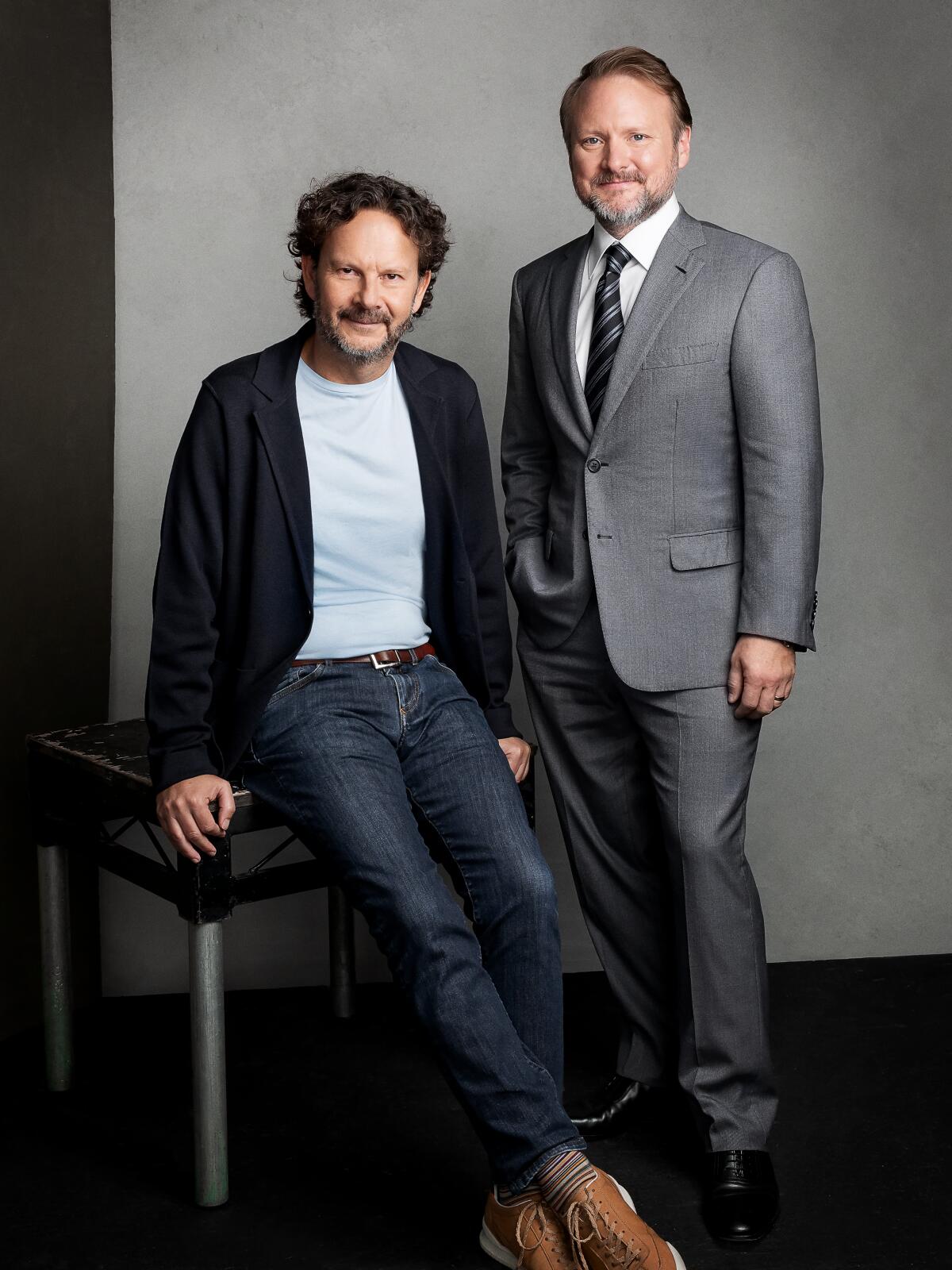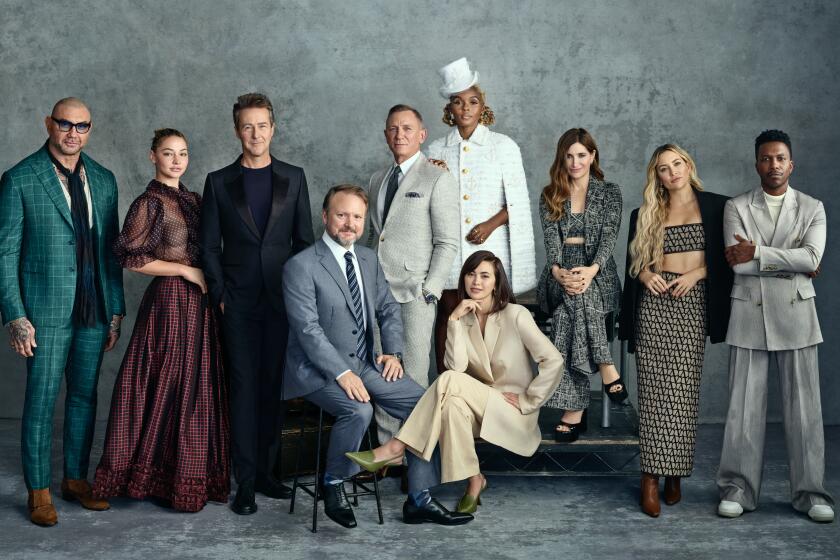Rian Johnson and Ram Bergman on the ‘crapshoot’ of making a hit movie

- Share via
With bona fide hits such as “Knives Out,” “Glass Onion” and “Poker Face” under their belts, filmmakers Rian Johnson and Ram Bergman could easily rest on their laurels and pursue only big-budget projects for their production company, T-Street. But the director–producer duo are instead putting their industry weight behind new filmmakers, working with such creatives as Chloe Domont and Cord Jefferson on their respective directorial debuts — both of which, “Fair Play” and “American Fiction,” have gone on to receive wide acclaim on the festival circuit.
Speaking with The Times days before the holidays, Johnson and Bergman discuss the value of small- and big-budget productions, what they look for in talent and the future of the film business.
It’s all in the dinner party approach to casting, says the ‘Glass Onion: A Knives Out Mystery’ director.
How have you seen studios’ appetite for financing projects change over the last five or 10 years?
Ram Bergman: I would say the business today is different than it was six months ago. It’s continually changing and evolving, but I still believe that whether it’s the studios or the streamers, they still need movies or TV shows. They need to fill the pipeline. Maybe they don’t need to make 500 or 600 shows. They will make 300 shows; they’ll spend less money making those, but they will.
I’ve heard two perspectives: Budgets will be reevaluated and move away from bloated films. And then there are some who are concerned that those middle- to lower-budget films will actually get overlooked because studios want to only focus on tent-poles and major franchises. How do you reconcile those perspectives?
Bergman: I don’t think that’s the case. For the tent-pole, they’re going to make those for less money than they used to. And I actually think, from my experience, and from talking to people and studios, they’re definitely going to be looking for those mid-level movies for sure. I may be wrong, we’ll find out — things can change in a few months.
For Rian Johnson, ‘Glass Onion’ came from a place of WWACD (What would Agatha Christie do?). First, she’d shake up the setting, and then she’d bring in a fresh cast of characters, he writes.
Do you see that sweet spot for the budget?
Rian Johnson: It depends on the movie. There’s still going to be room to make bigger projects with scope and scale. I feel like my perspective on it — Ram probably has a much more practical perspective — is a little more Pollyannaish, which is big, small, medium, if it connects with audiences, it doesn’t really matter. All the sizes can still work. And then when it doesn’t, then everyone rings the death knell, and they preach gloom and doom. And when it does, it’s a huge surprise and, ‘Oh, my God, medium-size movies are back!’ and it’s just this perpetual thing.”
You have to hope that will be the case because the opposite would be a pretty sad existence for the movie business.
Johnson: [Laughs] It’d be terrible. It keeps being proved over and over. There’s still small, medium and large movies that hit and don’t hit. It’s always a crapshoot.
T-Street has been really focused on supporting newer filmmakers. Are studios feeling more receptive to them?
Bergman: I don’t necessarily [think] studios are more or less receptive about new filmmakers. Maybe some studios are nervous about first-time filmmakers, but in general, I think people are the same way as we are: Are you excited by the filmmaker or by their voice or by their point of view and what it is they are trying to do?
Created by Rian Johnson of ‘Knives Out’ acclaim, the mystery-thriller features the actor playing an amateur detective with a unique set of skills — and a striking lineup of guest stars.
What are you hoping to bring to a new filmmaker who’s partnering with your company that’s different from any other incubator program in the industry?
Johnson: One of the things that I think is really special about what Ram and the team of producers at T-Street has put together is kind of modeled after what’s worked about Ram‘s and my relationship, which is as a producer–director relationship, it is tail to snout. It’s the entire animal from the first conception of the idea through writing the script, through prep, through post, all through putting the movie out. Our producers at T-Street — Ben LeClair and Nikos Karamigios and Leopold Hughes — are assigned to the filmmaker and to the project and they’re there from start to finish.
The hope is that they really form a bond and a relationship with that filmmaker and that the filmmaker gets to experience having — as opposed to a company where you’re dealing with different people, different departments — a producer who is there, start to finish. In that way, it’s kind of showing those producers the Ram method of supporting a filmmaker. Just from my perspective, that’s unique.
Bergman: On top of it, you have Rian’s support and my support on the bigger things. We have been doing this for many, many years so we’ve encountered all sorts of different scenarios or we can troubleshoot for somebody else. There’s a big difference if Rian, as a filmmaker, talks to another filmmaker, as opposed to just another executive.
We want to help the filmmakers not just in the first movie that they’re doing. We want to help them throughout their career [on] how to strategize certain things and just help them make the right choices.
When you’re looking for a newer filmmaker or producing partner to work with, are there some key elements that make you know this would be a good fit for T-Street?
Bergman: We have two things we keep saying, and it’s always been we want somebody who is really a singular filmmaker with a point of view. And they gotta be super nice.
Johnson: When you find those together, those are unicorns. You want to grab onto those.
Both for T-Street and industry-wide, what are you expecting to happen in the next year or so?
Bergman: For T-Street, we’ve got the second season of “Poker Face.” There’s “Three-Body Problem” that we were involved with that’s going to come out in March. Rian is going to direct his next movie.
As an industry, I think it’s going to be a tough year. It’s going to be a tougher year at the box office because of the strikes. We’ve [got] significantly less movies out there so it’s gonna hurt for everyone. But other than that, hopefully people will be making more movies because they haven’t been making them for five or six months. There’ll be more movies and more TV shows.
Where the business goes? I don’t know. You could have more mergers, like we’ve been reading in the last week, and in general, that’s not good for the talent because you have fewer buyers, fewer places to go and try to [sell projects to], fewer distributors out there. But I always say, if that happens, it gives the opportunity for starting new companies and to start alternatives to the studios or the streamers out there. Like anything else, it’s a cycle.
We’re seeing more and more projects specifically attached to a streamer get canceled. Things move around, like a show that was on Max is now landing on Netflix. Nothing, it seems, is tied exclusively to one studio or distributor. Has that changed the way that you’re thinking about selling your projects or the way that you think about the audiences that you’re making this for?
Johnson: It’s always kind of the same audiences, it’s just different types to them. Everything, in one sense, everything changes constantly. And the other sense is that the fundamentals of it today are relatively constant. I think you can get yourself in trouble if you start trying to do crazy 3-D math in your head, in terms of sanity, if the business affects what people will see.
Bergman: In the past, we’ve always sold, whether movies or TV shows, to whoever we thought was the most passionate about it, whoever wanted it most. And whoever wanted it the most, you could feel that they wanted it the most. Whether they were the biggest company or the sexiest company, whatever, whoever wanted it the most, that’s where we went with it. And most of the time, it paid off, so I think we will keep doing the same thing.
Rapid fire questions:
What are you both listening to these days?
Ram Bergman: Karina Longworth’s podcast, “You Must Remember This.”
Rian Johnson: An endless stream of audiobooks. I just listened to an amazing one, “An Immense World,” by Ed Yong, about how animals kind of perceive the world.
Favorite power-lunch spot?
Johnson: Smoke House [in Burbank]; you can never go wrong.
Bergman: Your Good Neighbor Restaurant on Cahuenga.
If you have to get really focused on a project, is there a ritual or practice you like to do?
Johnson: I like to feel intense feelings of self-doubt and self-loathing. I like to go into an extreme space of just feeling impostor syndrome. That tends to get me motivated.
Bergman: I like to wake up pretty early in the morning. Make sure there’s no kids around. 5, 4:30 a.m.
This interview has been edited for length and clarity.
More to Read
Sign up for The Envelope
Get exclusive awards season news, in-depth interviews and columnist Glenn Whipp’s must-read analysis straight to your inbox.
You may occasionally receive promotional content from the Los Angeles Times.











